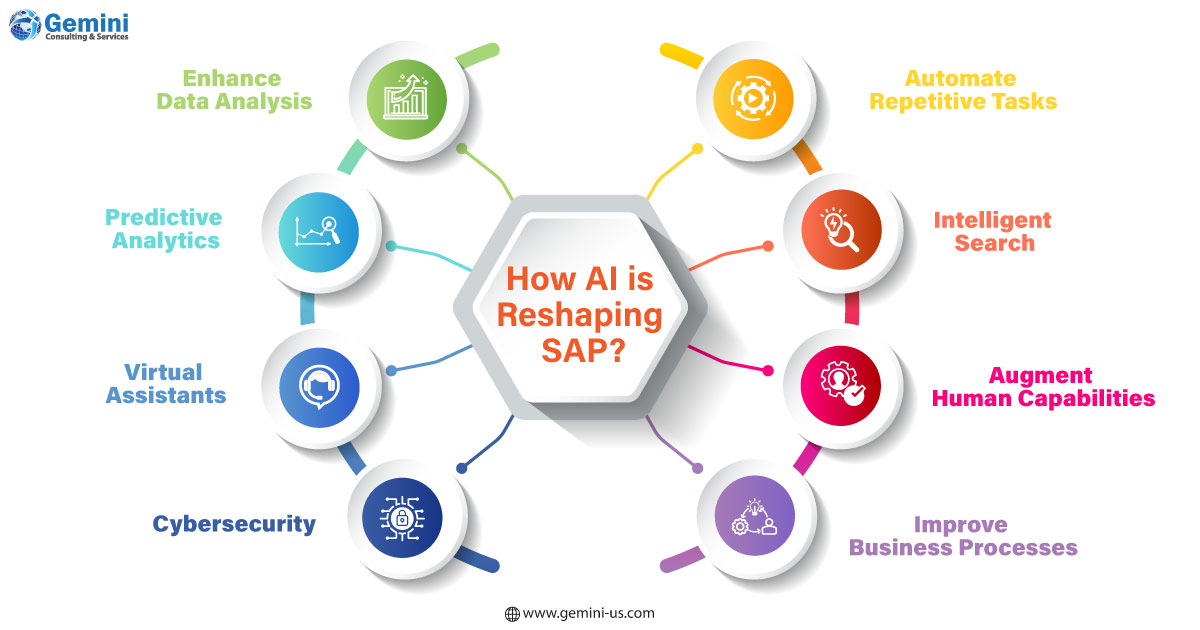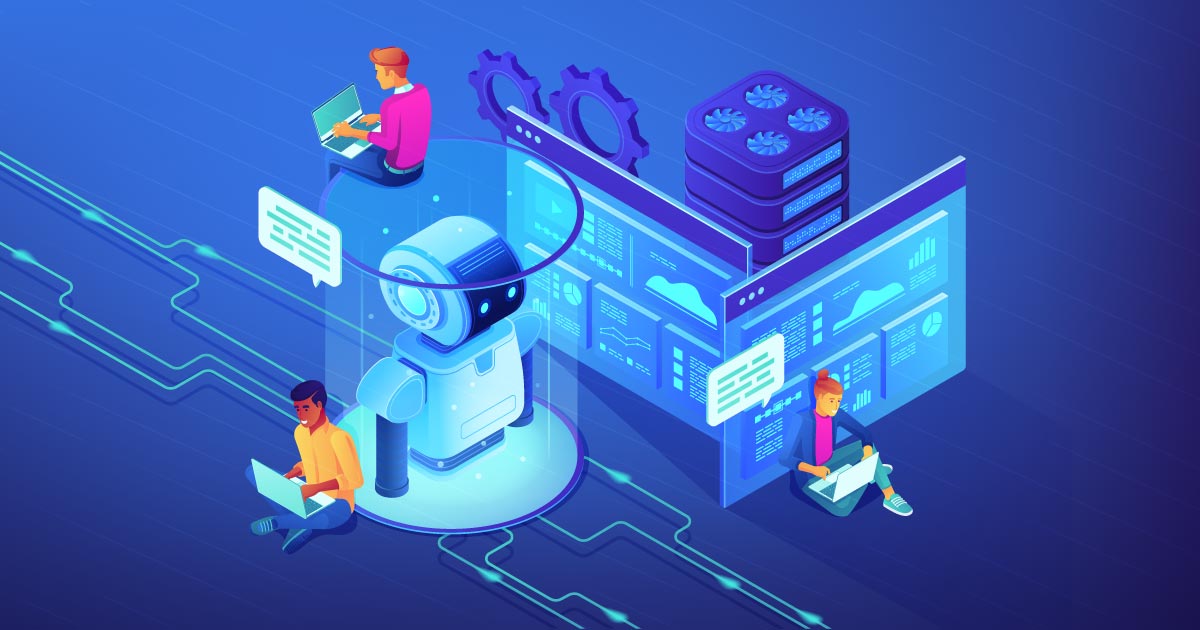SAP plays a pivotal role in the critical business functions of many worldwide organizations. Yet, in the current dynamic digital environment, these businesses must enhance their intelligence, agility, and reliance on data to maintain competitiveness. The conventional software in use proves inadequate, leading SAP to integrate artificial intelligence for a groundbreaking transformation.
SAP facilitates the progression of businesses into intelligent enterprises by leveraging Artificial Intelligence (AI) functionalities such as machine learning, automation, predictive analytics, and natural language processing. AI introduces innovations and efficiencies, enabling customers to operate with increased speed, intelligence, and agility in responding to shifts in the market. Let’s delve into the diverse ways in which AI is reshaping SAP.

- Automate Repetitive Tasks
AI empowers Robotic Process Automation (RPA) technology to autonomously replicate human actions through software bots. Bots developed with SAP Intelligent RPA efficiently handle repetitive tasks, including data entry and report generation, liberating human staff for more impactful work like strategic analysis and customer relationship building. AI automation not only prevents burnout but also fosters innovation. The substantial productivity gain from automating repetitive work with AI allows human employees to focus on meaningful tasks rather than monotonous repetition. Predictive Analytics
Artificial intelligence excels in predicting future trends, behaviors, and outcomes with high accuracy based on extensive historical data. Customers across various industry segments can utilize the predictive powers of SAP Analytics Cloud. For example, manufacturers can foresee and address demand surges or potential equipment failures using AI-powered predictive maintenance. Retailers can use it to understand customer preferences and market demands. Predictive workforce analytics enables HR departments of enterprises to gauge hiring requirements and skill availability.AI’s forward-looking capabilities empower organizations to be proactive and prepared, rather than reactive and caught off guard when changes occur. Actionable forecasts and projections generated by AI, enable businesses to plan smarter.
- Intelligent Search
Efficiently finding crucial information is essential for any enterprise’s functionality and competitiveness. SAP integrates advanced search algorithms driven by artificial intelligence into its solutions, providing swift and pertinent results to employee inquiries without relying on outdated keyword-matching methods. AI comprehends natural language and user intent, delivering precise, personalized outcomes within seconds. This streamlined access to specific data or documents empowers workers to execute their roles efficiently, free from inconvenience or delay. The intelligent search capabilities of an enterprise through AI not only save significant time for employees but also enhance productivity and facilitate convenient access to extensive organizational knowledge. - Virtual Assistants
Conversational AI chatbots, leveraging natural language processing, have revolutionized customer service by offering automated support 24/7 on a large scale. SAP can assist you in creating virtual assistants with similar capabilities through SAP Conversational AI, effectively managing routine inquiries from both employees and customers at affordable rates. AI chatbots promptly resolve common repetitive queries spanning sales, HR, IT, and various other domains, eliminating the necessity to engage valuable human agents. This significantly improves response efficiency and consistency while ensuring continuous support. SAP virtual assistants empower businesses to deliver cost-effective, personalized service consistently across channels, reshaping the landscape of enterprise interactions. - Augment Human Capabilities
Rather than replacing human workers, AI enriches what employees can accomplish. Machine learning algorithms process, analyze, and optimize vast datasets at a pace beyond human capabilities. Roles such as supply chain analysts can model numerous scenarios and address highly complex problems that were previously insurmountable. AI amplifies the achievements of existing employees, enabling them to undertake higher-value work, gain deeper insights, and identify optimizations previously undiscovered. By combining human creativity, imagination, and strategy with AI’s number-crunching abilities, SAP solutions empower customers to derive significantly greater business value. This symbiotic relationship between humans and artificial intelligence presents immense opportunities. Cybersecurity
Given the prominence of cyber threats confronting businesses, the incorporation of AI into SAP solutions extends their capacity to identify potential network breaches, malware, insider threats, unauthorized access, and various other risks at an early stage. AI-driven tools, such as SAP Enterprise Threat Detection, autonomously recognize irregularities and subtle patterns within systems, swiftly detecting both known and novel zero-day attacks more efficiently than conventional rules-based security software.The swift detection of AI-driven threats facilitates a prompt response, minimizing the impact of cyber incidents. Artificial intelligence significantly reinforces digital defences and enhances data protection against escalating cyber risks, establishing itself as an indispensable element for robust enterprise security.
- Improve Business Processes To streamline business operations across the organization, SAP incorporates intelligent algorithms and automation features through solutions like SAP S/4HANA. AI brings about a transformation in production planning, supply chain operations, logistics, forecasting, simulations, and other crucial functions by integrating real-world data, machine learning, and continual adaptation. This integration enhances efficiency, accuracy, agility, and overall performance across different departments.
AI fosters process excellence and seamless operations by intelligently automating routine tasks while also augmenting complex analysis capabilities.
As businesses embrace the intelligent features within SAP software, a new era characterized by heightened productivity, agility, and strategic decision-making unfolds. Partner with Gemini Consulting & Services to leverage the augmented capabilities of AI, in conjunction with SAP’s robust framework. Contact us to know how your enterprise can navigate the complexities of the digital landscape and proactively shape its future.

In summary, the integration of artificial intelligence into SAP solutions represents a pivotal moment for global enterprises. The profound influence of AI on SAP extends across various domains, ranging from streamlined data analysis and effective task automation to the predictive insights offered by analytics. This transformative integration does not aim to replace human capabilities but rather amplifies them, fostering a collaborative synergy that opens the door to unprecedented opportunities and innovation.
Essentially, the fusion of AI and SAP signifies a paradigm shift, where enterprises are not merely adapting to change but leveraging it to propel themselves into a more intelligent, responsive, and resilient era.



